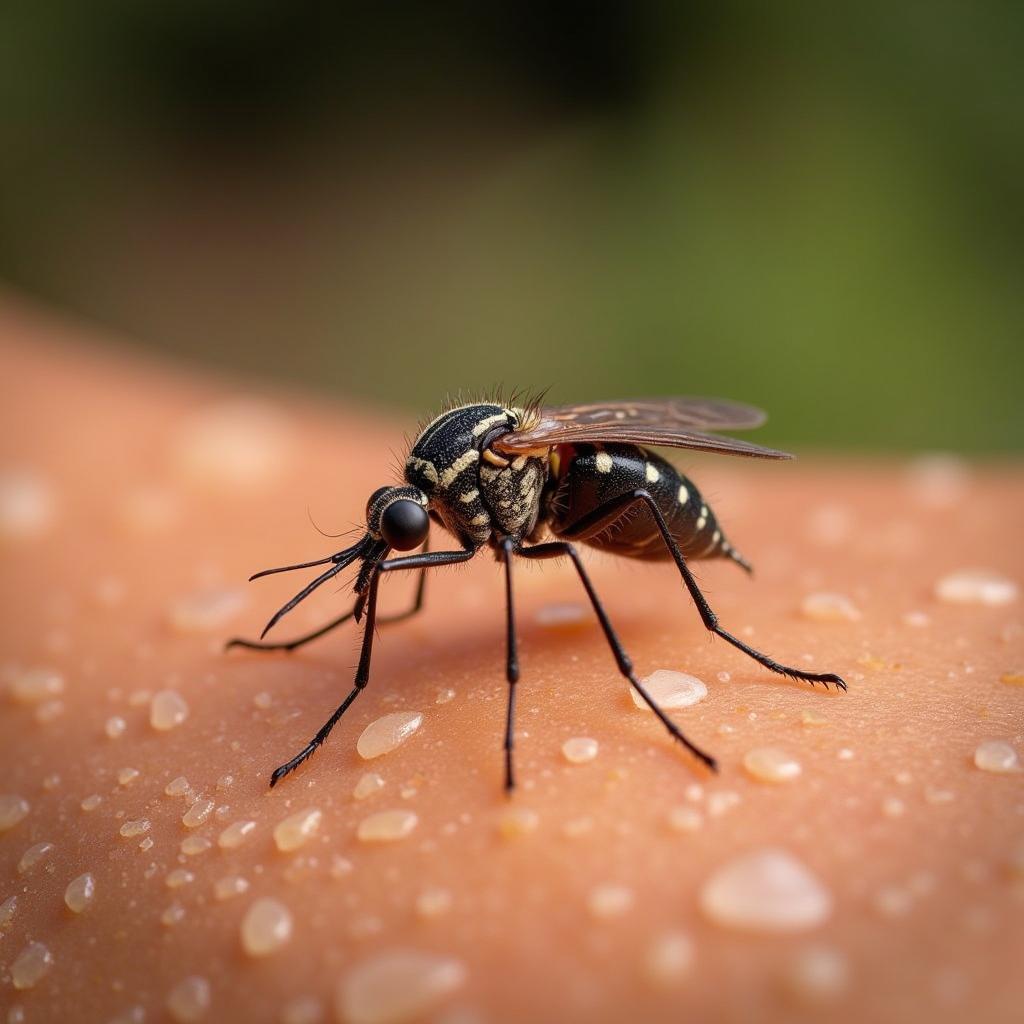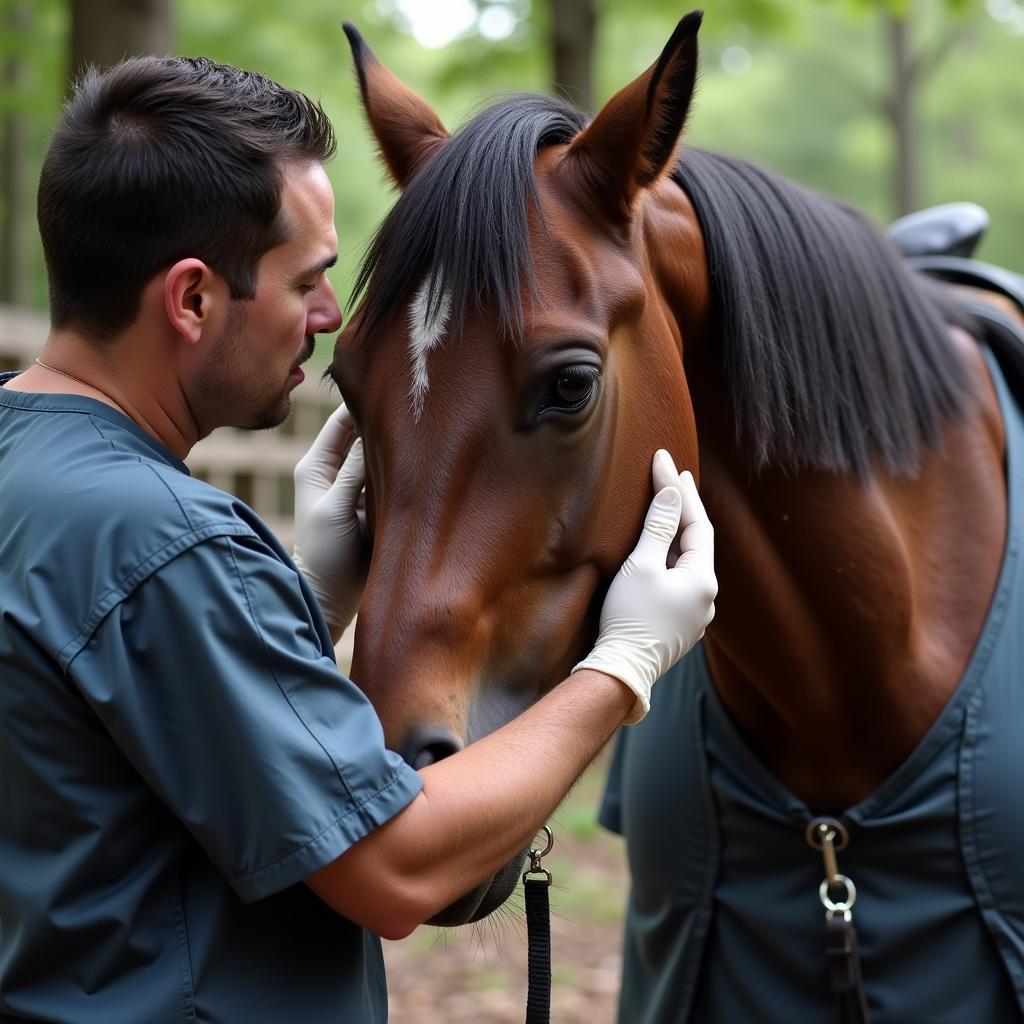African Horse Sickness in India: A Comprehensive Guide
African horse sickness (AHS) is a viral disease that affects horses, donkeys, and mules. It is a highly contagious and often fatal disease that can cause significant economic losses. Although the disease originates in Africa, outbreaks have occurred in other parts of the world, including India. This article provides a comprehensive guide to African Horse Sickness In India, covering its causes, symptoms, diagnosis, treatment, and prevention.
What is African Horse Sickness?
AHS is caused by a virus belonging to the genus Orbivirus and family Reoviridae. It is transmitted to equids primarily through the bite of infected Culicoides midges, which are small, biting insects that are often found near water sources. The virus replicates in the animal’s lymphatic system and can cause a range of clinical signs, from mild fever to fatal pulmonary edema.
How Did African Horse Sickness Reach India?
AHS is not endemic to India, meaning it doesn’t naturally occur there. The first recorded outbreak of the disease in the country was in 1960. While the exact mode of introduction is challenging to pinpoint retrospectively, it’s suspected that the virus entered India through infected animals transported from affected regions. This could have been through the movement of horses for racing, trade, or other purposes.
 Culicoides Midge on Horse
Culicoides Midge on Horse
Recognizing the Symptoms of African Horse Sickness
African horse sickness presents itself in several forms, each with its own set of symptoms and severity.
Pulmonary Form (Horse Flu)
This is the most severe form, often leading to death within a few days. Signs include:
- Rapid onset of high fever
- Difficulty breathing (dyspnea)
- Frothy nasal discharge, sometimes blood-tinged
- Swelling in the head and neck region
Cardiac Form (Dunkop)
Characterized by heart complications, this form can be fatal within a week. Symptoms include:
- Fever
- Depression
- Swelling of the eyelids
- Small hemorrhages on the mucous membranes
- Heart dysfunction
Mixed Form
As the name suggests, this form presents a combination of symptoms from both the pulmonary and cardiac forms.
Horse Sickness Fever
This is a milder form with a higher survival rate. Horses may exhibit:
- Fever
- Loss of appetite
- Lethargy
- Mild swelling around the eyes
Diagnosing African Horse Sickness in India
Early and accurate diagnosis of AHS is crucial for implementing control measures and preventing further spread of the disease. Here’s how the disease is typically diagnosed:
- Clinical Signs: Veterinarians rely on the animal’s history, the observed clinical signs, and the presence of the disease in the locality.
- Laboratory Testing: Confirmation of AHS relies heavily on laboratory tests, particularly:
- Virus Isolation: This involves culturing the virus from samples taken from the infected animal, offering definitive proof of infection.
- PCR Testing: Polymerase chain reaction (PCR) tests can detect the genetic material (DNA or RNA) of the virus, providing quick and accurate results.
- Serological Tests: These tests, like the enzyme-linked immunosorbent assay (ELISA), detect antibodies produced by the animal in response to the virus, indicating exposure.
 Veterinarian Examining Horse
Veterinarian Examining Horse
Treatment and Management of African Horse Sickness
Unfortunately, there is no specific treatment for AHS. Supportive care is the primary approach, aiming to alleviate symptoms and improve the animal’s chances of survival. This may involve:
- Rest: Keeping the infected animal calm and rested is crucial.
- Fluid Therapy: Providing intravenous fluids helps prevent dehydration and supports circulation.
- Anti-inflammatory Medications: Non-steroidal anti-inflammatory drugs (NSAIDs) can help reduce fever and inflammation.
- Antibiotics: While not effective against the virus itself, antibiotics may be used to prevent secondary bacterial infections.
Preventing African Horse Sickness: Key Strategies
Preventing AHS is paramount, and a multi-pronged approach is essential.
- Vaccination: Vaccination is the most effective way to protect horses from AHS. Several types of vaccines are available, and vaccination strategies may vary depending on the region and the risk of exposure.
- Vector Control: Controlling the Culicoides midge population is crucial. This can be achieved through:
- Stable Management: Keeping stables clean and dry, using insect-repellent screens, and employing insecticide sprays can help deter midges.
- Pasture Management: Avoiding grazing animals near water sources, particularly during peak midge activity periods (dawn and dusk), can minimize exposure.
- Movement Restrictions: Implementing strict quarantine and movement restrictions on animals from affected areas is critical in preventing the spread of the virus.
Conclusion
African horse sickness remains a significant threat to equines, particularly in endemic regions. While outbreaks in India are not as frequent as in Africa, the potential for devastating consequences emphasizes the need for continuous vigilance. By understanding the disease, recognizing its symptoms, and diligently implementing preventive measures, we can work towards safeguarding the health of horses and mitigating the impact of this devastating disease.
FAQs
1. Can humans get African horse sickness?
No, African horse sickness is not a zoonotic disease, meaning it cannot be transmitted from animals to humans.
2. Is there a vaccine for African horse sickness in India?
Yes, vaccines for AHS are available in India. It’s important to consult with a veterinarian regarding the appropriate vaccination schedule for your animals.
3. What is the mortality rate of African horse sickness?
The mortality rate varies depending on the form of the disease, but it can be as high as 95% in the most severe cases.
4. What should I do if I suspect my horse has African horse sickness?
Contact a veterinarian immediately if you notice any signs of illness in your horse, especially if AHS is suspected.
5. How can I learn more about protecting my horses from diseases like African horse sickness?
You can find more information on our website or by contacting our team of experts.
We encourage you to explore our other articles on animal health and welfare.
For any assistance or inquiries, please don’t hesitate to contact us:
- Phone: +255768904061
- Email: kaka.mag@gmail.com
- Address: Mbarali DC Mawindi, Kangaga, Tanzania
Our dedicated customer support team is available 24/7 to assist you.